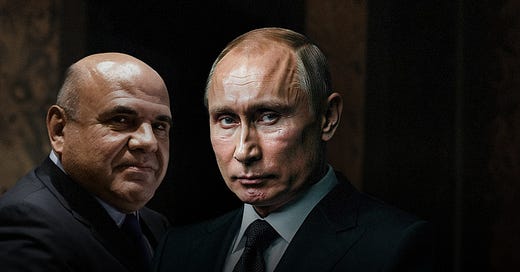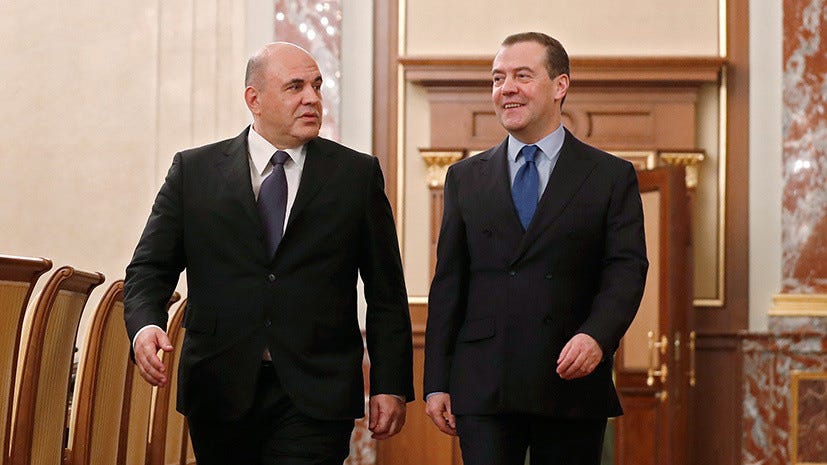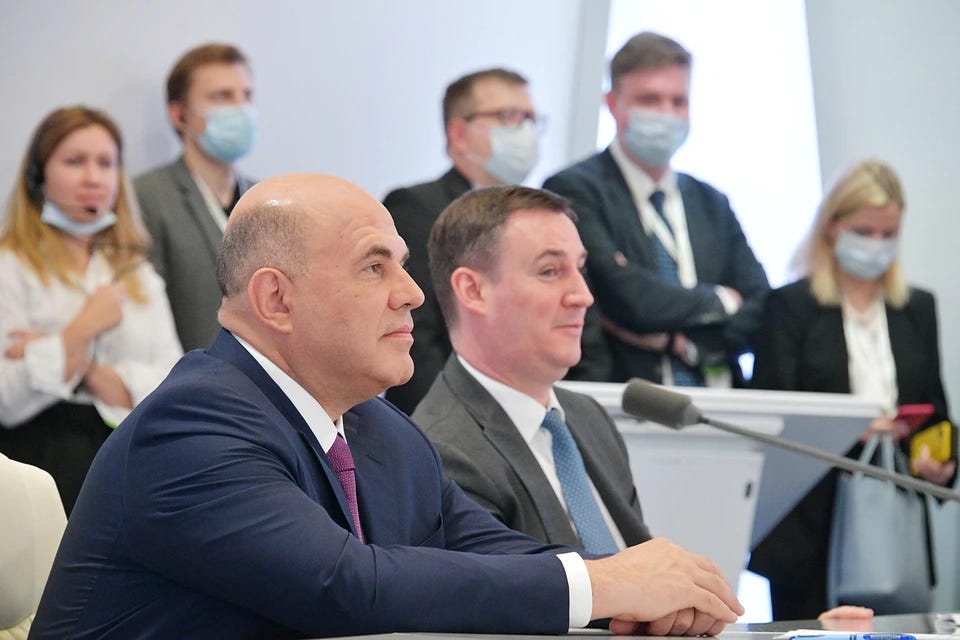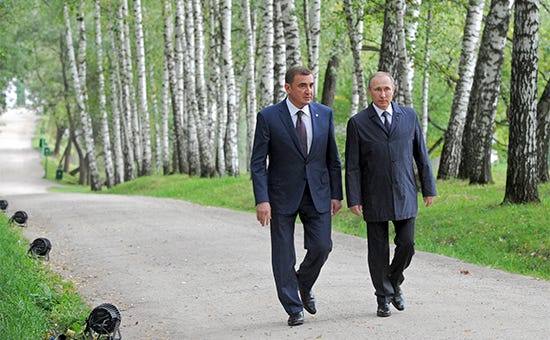On May 7th, another Putin’s inauguration will take place. Starting his new term, he will form a new government.
I continue my series "Tsardom," in which I talk about what is happening in the Russian elite, what rumors are circulating in the Kremlin, and where this might lead.
The Heir Apparent
The most important question Putin must address is who will become the Prime Minister. According to the Russian constitution, the Prime Minister is the second person of the state. The current Prime Minister (since January 2020) is Mikhail Mishustin. He is 58-years old, 4,96 ft tall and will become the President of Russia if Putin suddenly dies tomorrow. Whether Putin will replace the Prime Minister is the main topic of discussion in Russian political circles now.
Who is Mikhail Mishustin, a person almost unheard of outside Russia?
Before 2020, he headed the Federal Tax Service and was considered an incredibly efficient official. He was also known for being a very creative person. He loves music and poetry so much, he even was always making his employees organize parties, sing, and dance. And he was participating himself – a rare passion for a faceless bureaucrat.
Even more, Mishustin has always wanted to be close to Russian pop stars. He used to enjoy being surrounded by singers, artists, and stand-up comedians.
For example, once he wrote a song and offered it for the popular chanson singer Grigory Leps. And Leps even started performing it at concerts. And also, rumor has it that the Prime Minister is the godfather of a son of another legendary Russian singer, Valery Meladze. (Ironically, Leps supported the war, while Meladze, on the contrary, left Russia and supported Ukraine).
The Prime Minister's attitude towards artists vividly demonstrates the difference between him and Putin. For the president, any entertainers should be treated like servants. He has never shown any particular respect for the creative industry. For Mishustin, on the contrary, they are stars, and he has always sought to earn their attention.
There is no doubt that Prime Minister Mishustin is a clear and silent executor of everything Putin tells him. At the same time, it is evident that he does not like the war. Many of his favorite artists (and former friends) have left Russia. Even being loyal to Putin, he never dreamed of living in an isolated world similar to North Korea.
However, Mishustin has an obvious advantage, which is exactly the same as his disadvantage. Mishustin does not try to be associated with the war; he does not strive to be in the spotlight. He behaves exactly as an exemplary Putin's prime minister should. And, finally, it is not insignificant that he is shorter than Putin. All the prime ministers appointed by Putin in the past have invariably been shorter than him: Mikhail Fradkov, Viktor Zubkov, Dmitry Medvedev, and Mikhail Mishustin.
Prime minister Mikhail Mishustin and his predecessor Dmitry Medvedev
New People
The main drawback of Mishustin is his insufficient connection to the war. He is too much of a technocrat, a faceless official who dutifully executes orders, understands economics, and is known as an efficient manager without political ambitions. This was the ideal profile for Putin's prime minister in 2020. But over the past year everything has changed.
As of 2022, the overarching concept of Russian power could be described like this: the war should be unnoticed, passing quickly and ending in victory. The Kremlin long refused to believe this was impossible, but in 2023, the new strategy was found. It became a sacred war against the West, a clash of civilizations, a battle for the survival of the Russian people. In this new paradigm, there is a lot of exaggerated drama; initially, it wasn't taken seriously, but by the end of 2023, the Russian political elite began to embrace it, with many people taking it seriously. For a Russia engaged in a sacred war, Mishustin isn't suitable — he's too liberal, too compromised. This is precisely what the siloviki (security services) argue, as they push for Mishustin's replacement. For instance, the former director of the FSB, leader of the siloviki clan, Nikolai Patrushev, is advocating for his son, Agriculture Minister Dmitry Patrushev, to assume the prime minister's role.
Mikhail Mishustin and Dmitry Patrushev
However sources suggest Patrushev Jr. might rather become a deputy prime minister, which is still a promotion, but his chances of leading the government are slim. Putin knows it could be too risky - if Patrushev Jr. becomes the heir apparent, Putin might not wake up the next day.
Another official who has been touted as a potential prime minister in recent weeks is Alexei Dyumin, the former bodyguard of Putin and currently the governor of the Tula region. Dyumin has had a remarkably diverse career trajectory: he served as the deputy defense minister and oversaw the annexation of Crimea in 2014. He also supervised the establishment of the Wagner Group in 2015. In 2016, he was appointed to lead an important industrial region not far from Moscow. He was even rumored to be a potential successor to Putin, though the latter shows no signs of stepping down, thus a successor is not currently needed.
However, Dyumin recently faced a setback in a significant bureaucratic struggle. Last year he was promised that businessmen linked to him would assume control over Rolf, the largest car dealership network in Russia. Until December of last year, Rolf was owned by Sergey Petrov, the sole Russian businessman who openly supported Alexei Navalny and his Anti-Corruption Foundation. In 2019, Petrov faced criminal charges and was forced to leave Russia. Then, in 2023, his business was expropriated by a direct decree from Putin. Initially expected to be awarded to the former presidential bodyguard, the profitable company ultimately went to someone currently closer to Putin: Sergey Rubzhnoi, head of the presidential security service, or rather, to businessmen allied with him. This narrative vividly illustrates the dynamics of power in Russia: proximity to Putin determines strength.
Dyumin and Putin
Nevertheless, Dyumin is still poised for advancement. He met with Putin last week, on May 2. The question now is what role Putin will assign him. There were suggestions that Dyumin might contend for the position of defense minister. However, given the ongoing war, it is unlikely that Putin will replace Sergey Shoygu at this juncture. Therefore, another potential position for Dyumin is the minister of industry.
Nevertheless, if Dyumin does assume this role, it would bring him one step closer to the position of Putin's successor, as he would gain experience working at all levels of government.
Old Clans
Despite numerous rumors, all sources note that Putin is now more secretive than ever. He obsessively loves surprises, so he rarely allows leaks about the decisions he has made regarding the new government configuration. However, most likely Mishustin will retain his post - Putin simply considers the current situation too stable to change it.
However, the new government will become even more clan-based. All major groups: the Kovalchuk brothers, the Rotenberg brothers, former FSB officers, former bodyguards - all are trying to occupy more space and place their people in the government.
I will tell you about whether they will succeed and which clans will govern Russia in the coming years in a week - in the next episode of "Tsardom". It is expected that on May 10th, the day after the military parade on Red Square, Putin will announce his choice.







